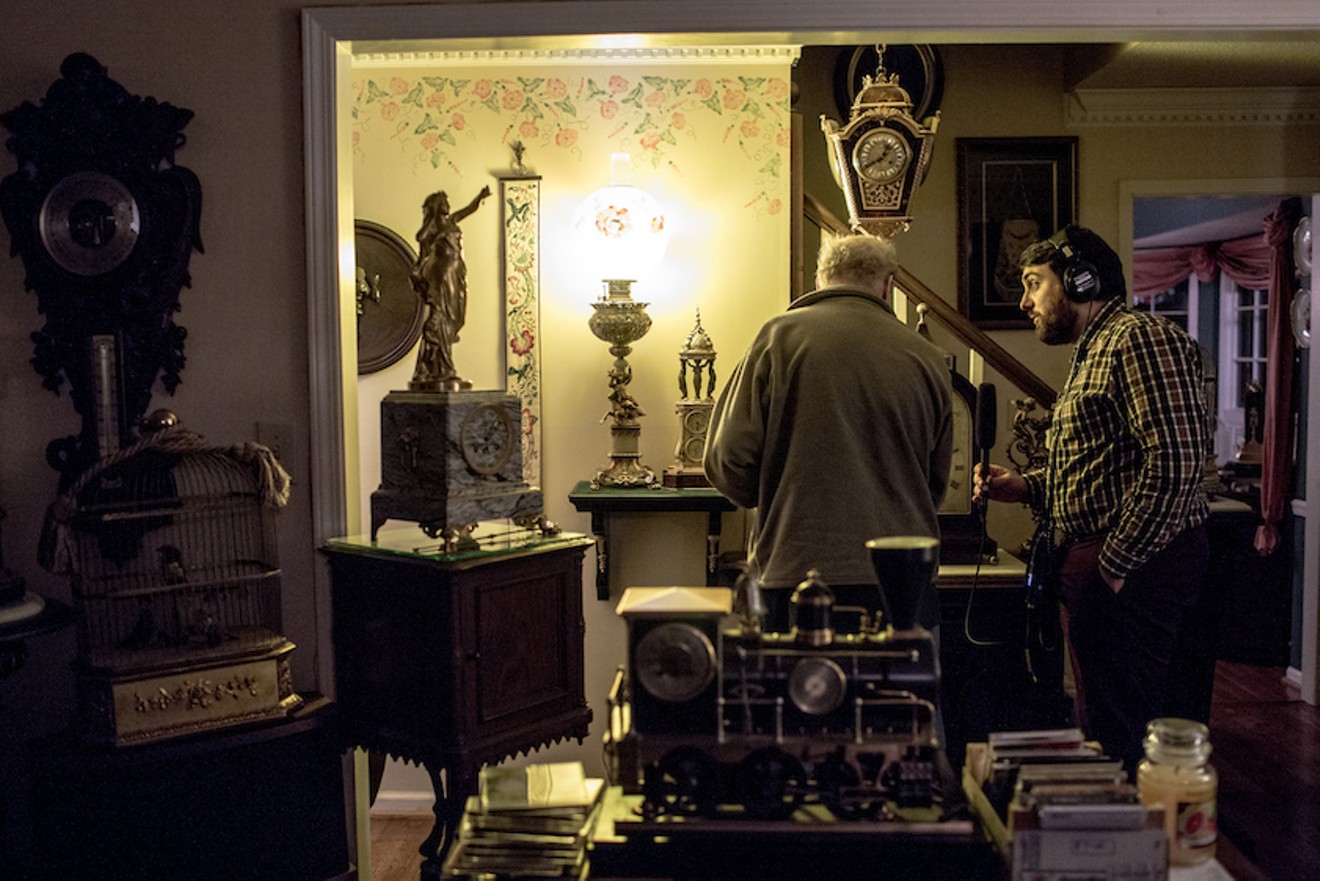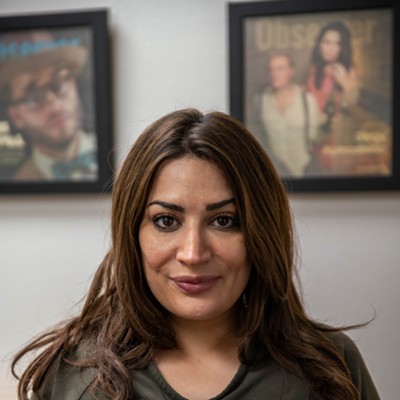Dallas musician Daniel Hart seems to attract successful projects. The Dark Rooms frontman is a film composer whose body of work includes the scores for Disney's Pete's Dragon and upcoming A Ghost Story, starring Casey Affleck.
Hart recently debuted the soundtrack he composed for S-Town, a podcast created by the producers of Serial and This American Life. S-Town begins with the investigation into an alleged hushed-up murder in a small Alabama town, and quickly evolves from a Making a Murderer premise to a portrayal of rural unhappiness. The series, which premiered this March, has already broken records, with over 16 million downloads in its first week alone.
And Daniel Hart was just the man to guide listeners through S-Town's emotional narrative. The musician spoke to the Dallas Observer via phone from his home in Los Angeles, where he relocated with his band in January, to discuss how he became involved in the project and the process behind creating the soundtrack.
Dallas Observer: How were you first approached about this project?
Hart: [Producer] Ira Glass reached out to me in December about a new podcast that they were working on to see if I had interest and availability in composing for it. I had been recommended to him by mutual friends, so I think he listened to some of my music and thought that it could be a possible fit, so he asked me to write a couple of pieces.
Did you have any context when you were asked you to write the initial pieces?
[Glass] gave me a general description of the podcast and then he sent me a clip from one of the episodes, but this was back in December, and they were pretty heavy in editing, so there wasn't a whole lot for me to listen to at the time. He asked me to write a couple of pieces based on what he had told me and what I'd heard, just to see if it was the right fit. The very first piece that I wrote and turned in ended up being the theme for the podcast, so it seemed like we were approaching it from the same aesthetic.
Did you get a chance to hear the whole podcast when you wrote the rest of the music?
No, because it still wasn't done. They were editing it all the way up through March, still fine-tuning, so I had a couple of episodes and a couple of scripts that I was able to read through to get a sense of where the story was going.
How many songs total did you end up submitting?
Nineteen or 20 pieces of music; somewhere around there. And then they felt they had enough to work with.
What kind of band were you working with?
This is all me, this time. I did it all myself at home. The first couple of things that I wrote needed to be done quickly, short turn-around time, so there wasn't really any time to bring anybody else in. And then they really liked those things so I thought I should just continue doing what I was doing. There are songs by other people that were used on the podcast, but I didn't do any collaborating with anybody.
Did they let you know which mood they wanted or did they give you some freedom to interpret the material?
They gave me a lot of freedom. They didn't necessarily want me to write music for specific sections of the podcast; that only happened a couple of times. Whereas with a film, everything that I write is meant for a specific scene, a specific moment. But in this case they wanted me to write a bunch of music that was evocative of what they had created and then they would take that music and find the right place for it later on.
And I think towards the beginning I started writing music that was more fitted to something resembling a murder-mystery, because the first episode or two in the podcast very much heads in that direction. But then it takes a left turn in the podcast and then they had to tell me "Don't think that's gonna be what the entire podcast is about. We don't need a whole bunch of murder-mystery music. That's great, but give us something rhythmic."
But I think probably after six or seven pieces and a bunch of back and forth, we got to a place where I felt like I understood everything they were going for and everything that they needed. And from that point on everything I turned in, they were happy with it. We were on the right track.
There are many dark themes explored in this podcast. Is there one emotion that's harder for you to compose for? Do you have a favorite?
I think my general default is to write music that is melancholy in some way, that has some kind of sadness to it. But I think the podcast didn't actually need that as much as some other mediums do, that I work within. I tried to stay away from that for the most part. I tried to write something that felt true to the story from what I knew of it, but also something that was leaning toward more emotionally neutral [rather] than trying to convey a specific emotion. Because the podcast itself does the much heavier lifting in that department.
When there's no visual to go along with a story, do you feel challenged to help create a mental image?
I thought it would be a greater challenge because there's less information to go on. Usually when I'm working on a film the picture gives me a whole lot of helpful info in what is needed musically, and I thought without that I would be a little bit in the dark, but when I listened to the podcast and read the script it felt like a very full story to me.
I could visualize what was going on and I felt like I had all the information I needed to write the music that I ended up writing. I think also having spent time in Alabama and also having lived in the South for part of my life, I wanted to create music that was also in some way expressive of my own experiences, that shared some similarity to the story. And it was important to me to create music that allowed the possibility for complexity and avoided cliches. That was my attempt.
Is it harder to do a soundtrack than write your own music, or is it easier because there's a guideline in place?
I feel like there's good and bad in both. In some ways one is easier because I have these guidelines so it narrows the possibilities and then helps me to refine the overall voice, and allows for more consistency in the choices of instrument or the melodic content. But on the other side, if there's total freedom, then maybe it gives me an opportunity to explore ideas I wouldn't if I was being given a narrow field within which to work.
What was your thought process when approaching the assignment? Did you think of particular notes, instruments or methods you felt were appropriate?
Well, with S-Town the instrumentation was figured out pretty early on in the process. I felt like we hit on a certain combination of instruments that worked pretty well together so I wanted to stick with that, provide that coherent aesthetic for the music.
Ira had some ideas about what kind of instrumentation might work. He though maybe hip-hop drums and strings could play some part, and that made me really happy to hear because that's basically one of my defaults. And then I talked to Julie Snyder, the main producer on the podcast, and she had more ideas, and she sent me some pieces from This American Life, with the reasons why they worked so well, so I had that as another guideline.
And that's where I took my inspiration, more than trying to pick instruments to convey emotion. But I did end up using a fair amount of violin, cello and banjo, because over the past several years I have found those to be some of the most expressive instruments that I know how to play, that convey what I want to convey emotionally.
Are you a podcast listener in general?
I am. I listened to so much This American Life; I love it so much. I was really happy. I was absolutely thrilled to get this opportunity, and honored to be able to work with people who I consider to be master storytellers.
You've been an actor in the past; does that background help any to get in the mindset of these characters?
I have a degree in playwriting; I think it's more that. I was never a very good actor, but I felt like I was OK at playwriting, at least at studying it, and I think part of why I enjoyed studying it so much is because I enjoyed studying characters and their motivations: why do people do the things they do.
Does it make you tempted to step in front of the camera or perhaps lend your voice?
It doesn't. [Hart laughs.] I feel like I've found things that really fulfill me. When I was a kid I really wanted to be an actor and I was obsessed with celebrities, and I think after being in school with a bunch of really good actors I could see that is something that is not as much in my wheelhouse as the stuff I'm doing now. I feel no sadness about that. I'm glad there are people out there who are really good at acting, and I'm glad that I'm doing what I do.
[
{
"name": "Air - MediumRectangle - Inline Content - Mobile Display Size",
"component": "18855504",
"insertPoint": "2",
"requiredCountToDisplay": "2"
},{
"name": "Editor Picks",
"component": "17105533",
"insertPoint": "4",
"requiredCountToDisplay": "1"
},{
"name": "Inline Links",
"component": "18349797",
"insertPoint": "8th",
"startingPoint": 8,
"requiredCountToDisplay": "7",
"maxInsertions": 25
},{
"name": "Air - MediumRectangle - Combo - Inline Content",
"component": "17105532",
"insertPoint": "8th",
"startingPoint": 8,
"requiredCountToDisplay": "7",
"maxInsertions": 25
},{
"name": "Inline Links",
"component": "18349797",
"insertPoint": "8th",
"startingPoint": 12,
"requiredCountToDisplay": "11",
"maxInsertions": 25
},{
"name": "Air - Leaderboard Tower - Combo - Inline Content",
"component": "17105535",
"insertPoint": "8th",
"startingPoint": 12,
"requiredCountToDisplay": "11",
"maxInsertions": 25
}
]













